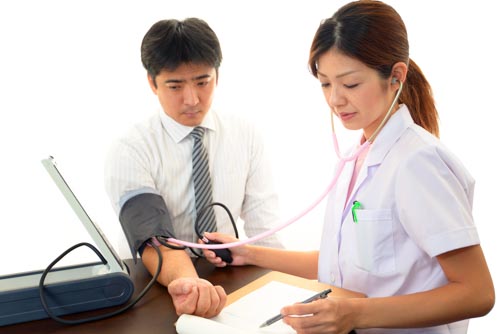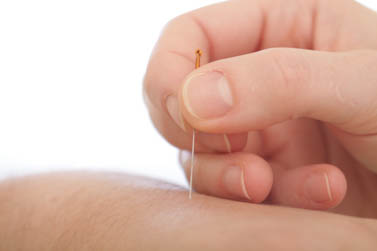Acupuncture is an effective treatment for hypertension. Researchers demonstrate that acupuncture alleviates hypertension and its signs and symptoms.  Zhao et al. conclude that acupuncture reduces levels of high blood pressure and relieves associated headaches, dizziness, tinnitus, and anxiety. In addition, acupuncture successfully alleviates palpitations due to hypertension.
Zhao et al. conclude that acupuncture reduces levels of high blood pressure and relieves associated headaches, dizziness, tinnitus, and anxiety. In addition, acupuncture successfully alleviates palpitations due to hypertension.
Zhao et al. document an important biological response to acupuncture. The researchers show that acupuncture regulates TNF-α and TNF-α-stimulated endothelin (ET) in patients with hypertension. High blood pressure stimulates higher than normal concentrations of TNF-α and ET. The researches demonstrate that acupuncture successfully downregulates TNF-α and ET for patients with hypertension while simultaneously reducing blood pressure levels and related signs and symptoms.
Zhao et al. note that the work of Liang et al. supports their findings. Liang et al. find acupuncture effective for the relief of peripheral vasospasms. In addition, the work of Liang et al. demonstrates that acupuncture significantly promotes cardiac output.
 Zhao et al. achieved successful clinical results by the application of acupuncture points including:
Zhao et al. achieved successful clinical results by the application of acupuncture points including:
GB20 (Fengchi)
Taiyang
Yintang
Sishencong
Anmian
The acupuncture point selection primarily focuses on acupoints that are labeled as extra points. GB20 is the exception. Needle retention time was thirty minutes per acupuncture session and manual stimulation was applied every ten minutes. Lifting and thrusting techniques for tonification and sedation were added where appropriate, including the elicitation of deqi.
In related research, a team of investigators from the University of California School of Medicine (Irvine, CA), Southern California University of Health Sciences (Wittier, CA), and East Hospital (Shanghai, China) had similar findings. They published research entitled 'Long-Lasting Reduction of Blood Pressure by Electroacupuncture in Patients with Hypertension: Randomized Controlled Trial' finding electroacupuncture effective for reducing blood pressure and producing long lasting clinical results. They add, “Sympathetic and renin-aldosterone systems were likely related to the long-lasting EA (electroacupuncture) actions.”
The researchers note that weekly acupuncture treatments applied to PC5 (Jianshi), PC6 (Neiguan), ST36 (Zusanli), and ST37 (Shangjuxu) lowered both diastolic and systolic blood pressure in patients with hypertension. Onset of clinical results was slow but long lasting. The researchers add that electroacupuncture has a “stronger effect” on lowering systolic blood pressure than diastolic blood pressure. They add that acupuncture decreases both peak and average systolic blood pressure and therefore “may decrease the risk for stroke, peripheral artery disease, heart failure, and myocardial infarction in hypertensive patients.” Given the importance of the findings on human health, the researchers advise continued investigations into the efficacy of acupuncture for the treatment of hypertension.
References:
Zhao YH, Wang YF, Li TR & He CY. (2015). Regulating Effect of Acupuncture at Fengchi (GB20) and Extraordinary Acupoints on TNF-α and ET in Hypertension. Shanghai Journal of Acupuncture and Moxibustion. 34(4).
Liang WJ & Wang QH. (2007). Research Progress of Acupuncture combined with Tui Na in treating Hypertension. Massage Guideline. 23(7):41-43.
Li, Peng, Stephanie C. Tjen-A-Looi, Ling Cheng, Dongmei Liu, Jeannette Painovich, Sivarama Vinjamury, and John C. Longhurst. "Long-Lasting Reduction of Blood Pressure by Electroacupuncture in Patients with Hypertension: Randomized Controlled Trial." Medical acupuncture 27, no. 4 (2015): 253-266.


